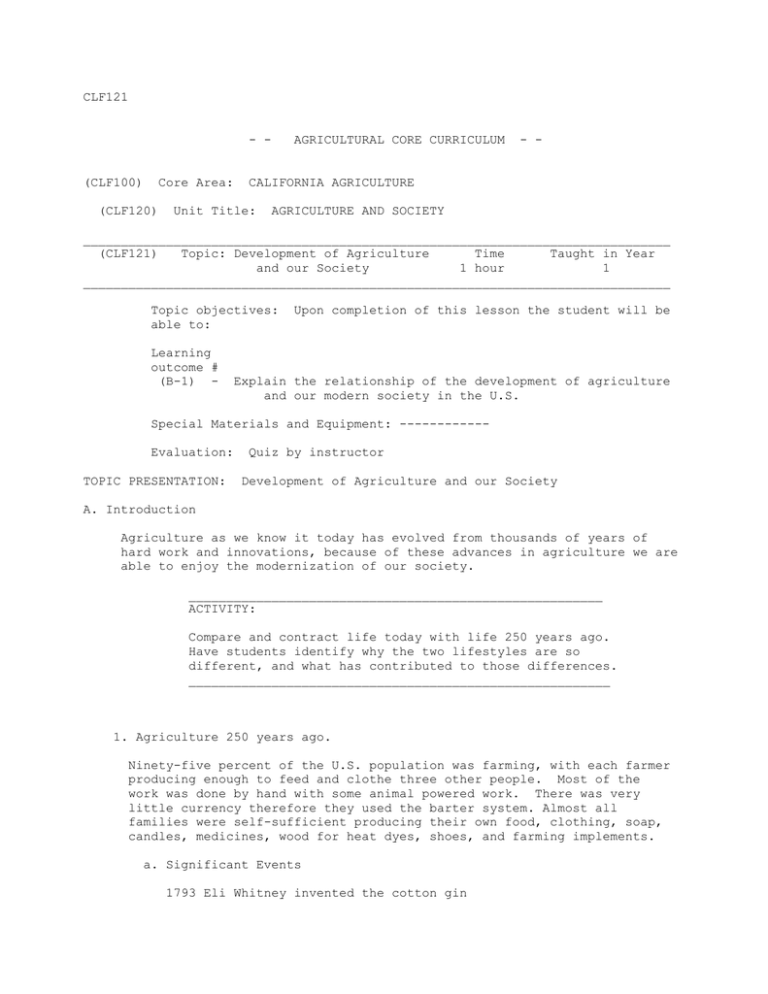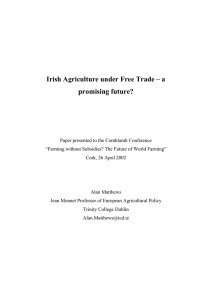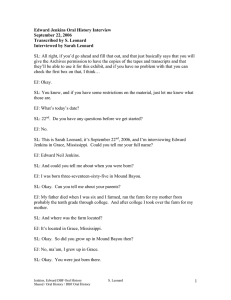CLF121
advertisement

CLF121 - (CLF100) Core Area: (CLF120) AGRICULTURAL CORE CURRICULUM - - CALIFORNIA AGRICULTURE Unit Title: AGRICULTURE AND SOCIETY ______________________________________________________________________________ (CLF121) Topic: Development of Agriculture Time Taught in Year and our Society 1 hour 1 ______________________________________________________________________________ Topic objectives: able to: Learning outcome # (B-1) - Upon completion of this lesson the student will be Explain the relationship of the development of agriculture and our modern society in the U.S. Special Materials and Equipment: -----------Evaluation: TOPIC PRESENTATION: Quiz by instructor Development of Agriculture and our Society A. Introduction Agriculture as we know it today has evolved from thousands of years of hard work and innovations, because of these advances in agriculture we are able to enjoy the modernization of our society. _______________________________________________________ ACTIVITY: Compare and contract life today with life 250 years ago. Have students identify why the two lifestyles are so different, and what has contributed to those differences. ________________________________________________________ 1. Agriculture 250 years ago. Ninety-five percent of the U.S. population was farming, with each farmer producing enough to feed and clothe three other people. Most of the work was done by hand with some animal powered work. There was very little currency therefore they used the barter system. Almost all families were self-sufficient producing their own food, clothing, soap, candles, medicines, wood for heat dyes, shoes, and farming implements. a. Significant Events 1793 Eli Whitney invented the cotton gin 121.1 2. Agriculture 200 years ago In fifty years change was little with ninety-two percent still farming and providing for four others. The barter system was still in place and used mostly for trading soap, candles, medicines, shoes as farm families were becoming slightly less self-sufficient. a. Significant Events 1836 the grain combine was patented. 1837 John Deere began manufacturing plows. 3. Agriculture 150 years ago Ninety percent of the population was farming and producing for 5 others, however innovations were being made: a. Significant Events 1855 Michigan and Pennsylvania established the first state agricultural colleges. 1862 President Lincoln created the first Department of Agriculture. 1869 Transcontinental railroad was completed which opened up markets for trade. 1875 first grain silos built 1881 Hybridized corn produced 1892 the first gasoline tractor was built 4. Agriculture 100 years ago Over the past fifty years significant change had occurred. The farming community dramatically decreased to 50% with each framer provided for 7 others. Most work was steam, animal, wind, or water powered. The gasoline tractor had just been invented. Banks started lending money to farmers to purchase land and equipment. Farm families still produced most of their won food and wood for heat, but the became consumers for the remaining needs. a. Significant Events 1919 The American Farm Bureau Federation was organized. 1922 The Capper –Volstead act passed. 1933 Farm Credit Administration was established 1940 School milk program initiated 1947 General agreement on Tariffs and Trade was negotiated 121.2 5. Agriculture 50 years ago Only Thirty percent of the population was farming with each farmer providing for 11 others. The gasoline tractor was in general use, but horses still outnumbered tractors as the main source of power on the farm. Banks provided capital to farmers, however farmers were trying to avoid it because of the massive farm losses and foreclosures of the 20’s and 30’s. a. Significant Events 1959 Food for Peace Program and the Mechanical tomato harvester developed 1964 National Food Stamp Passed 1979 Grain embargo imposed against the Soviet Union 1991 More farmers use Integrated Pest Management IPM) 1993 Passage of the North American Free Trade Agreement (NAFTA) 6. Today Less than 2% of the U. S. population is involved with production agriculture. Each farmer Provides the food and fiber for 148 others. There are many governmental programs to stabilize production and prices, insure supplies, limit soil erosion, and regulate genetic engineering. For every dollar produced by agriculture, six to eight other dollars are generated in a community. a. Significant Events The U.S. supplies 1/2 of the world grain sold on the world market. The number of farmers have declined but related agricultural jobs have increased. Agriculture in the U.S. is immense and complex. It affects the food supply, clothing supply, shelter, our livelihoods, and our national security. American agriculture is the mose efficient in the world. The standard of living in the United States is a result of agriculture. most abundant food supply on Earth. We have the cheapest, safest, and __________________________________________________________ ACTIVITY: Have students discuss the role agriculture plays in the stability of a country. Question: Name a country that is economical stable, but is not self-sufficient in producing their agricultural needs. __________________________________________________________ 121.3



